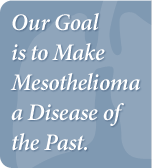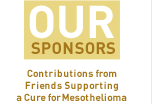VEGLIN Clinical Trial:
New Hope for Cancer Cure
In Anti-Angiogensis Drugs
Veglin is a new anti-angiogenesis drug. Anti-angiogenesis drugs promise much potential in the fight against a variety of cancers and possibly a cure. Here is how it works.
The formation of new blood vessels in the body is called angiogenesis. While angiogenesis is a natural process essential to the healing of a wound, the process unfortunately also feeds the growth of cancerous tumors and disease like mesothelioma. A newly formed cancerous tumor cannot grow beyond a certain size without the aid of blood vessels. Tumors attract nearby blood vessels by secreting Vascular Endothelial Growth Factors (VEGF). This induces blood vessel growth into the cancerous tumor providing a flow of oxygen and essential nutrients necessary to sustain cancer malignancy, like mesothelioma.
VEGF is a class of naturally occuring proteins that stimulate growth and survival of the cells of the vascular system, the network of blood vessels (arteries, arterioles, venules, capillaries and veins) in the body. VEGF is found in high concentrations within patients with malignant mesothelioma. The VEGF helps the cancerous tumor grow and spread rapidly.
However, anti-angiogenesis drugs, such as Veglin, are angiogenesis inhibitors that prevent the continuous formation of new blood vessels by stopping the production of VEGF, and thereby prevents the flow of oxygen and needed nutrients to the cancerous mesothelioma.
So, Veglin is an anti-angiogenesis drug engineered to specifically stop blood vessel formation at cancerous tumors such as mesothelioma. Early clinical trials of the Veglin anti-angiogenesis drug have demonstrated significant potential in the fight against a variety of cancers. These include malignant mesothelioma, renal cell carcinoma, metastatic colorectal cancer, and lymphoma. Anti-angiogenesis drugs have already proven to be successful in slowing the spread of malignant cancer cells, and in some cases even killing these cells.
Veglin is also an antisense oligonucleotide, which means that it can bond to a messenger nucleic acid that directs protein production and blocks the production of VEGF proteins. Based on current clinical trials, Veglin is proving itself to be successful at blocking tumor secretion of VEGF proteins capable of preventing metastasis while simultaneously killing existing cancer cells.
About Clinical Trials
Clinical trials are separated into four distinct phases:
Phase I & II: the first two phases of any clinical trial revolve around drug safety. Candidates for phases I & II include patients with an advanced form of a given disease (in this case, cancer), who are given the opportunity to try experimental treatments.
Phase III: the third phase of any clinical trial revolves around comparing the drug with standard forms of treatment proven to work. Participants of phase III have a more optimistic prognosis while also meeting clinical trial criteria.
Phase IV: the fourth and final phase of any clinical trial coincides with the preliminary marketing of the drug. Studies gather information on the drug's effect in various populations while monitoring any long-term side effects.
Early Veglin Clinical Trial Results
The results of Phase I clinical trials for Veglin covered a study of VEGF-Antisense Oligonucleotide in the treatment of relapsed or refractory malignancies. The study results were reported by Dr. Parkash S. Gill before the American Society of Clinical Oncology at their annual meeting. Dr. Gill detailed Veglin's success at blocking tumor growth in patients suffering from lymphoma, sarcoma, Karposi's sarcoma, and colon and lung cancers. In some instances, Veglin was successful in stabilizing or reducing tumors.
Phase II of Veglin trials began in late 2004, targeting renal cell carcinoma, malignant mesothelioma, leukemia and lymphoma. Dr. Parkash Gill and his fellow researchers are very optimistic that the phase II clinical studies will also yield much positive results.
To determine if you qualify for the Phase II Veglin studies, please consider contacting Elizabeth Paul, Executive Director, by calling 1-800-909-MESO (6376), or use this form to Ask Dr. Gill about the trials.
Also, consider going to our FaceBook page:
to obtain a FREE copy of the eBook: "10 Easy Steps to Find and Choose a Clinical Trial."



For questions related to the foundation and to make contributions please contact:
Executive Director
Toll Free:
(800) 909-Meso (6376)
3011 Townsgate Rd, Suite 450
Westlake Village, CA 91361
For more information and other questions contact:
(800) 909-6376
©2016 Mesothelioma Research Foundation Of America

